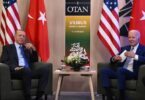Jim Garamone
WASHINGTON: Secretary of Defense Lloyd J. Austin III discussed matters of mutual concern with Chinese Defense Minister Gen. Wei Fenghe in Siem Reap, Cambodia, today.
The two defense leaders are attending the Association of Southeast Asian Nations defense ministers’ meeting. The secretary last met China’s defense leader at the Shangri-la Dialogue in Singapore in June.
Last week, President Joe Biden met with Chinese President Xi Jinping in Bali, Indonesia. The two leaders agreed it’s important that their countries work together to ensure that competition does not veer into conflict.
“Secretary Austin has spoken frequently about importance of open lines of communication between major powers including the United States in the PRC , and today he was following up on that, that discussion,” said a senior defense official at the conclusion of the meeting.
Still, competition remains the defining feature of the relationship between the two nations, the official said, and Austin expressed some concerns about China’s military behavior. He also pressed the Chinese to resume military dialogues and mechanisms to help manage that competition responsibly.
Re-starting already established mechanisms would help reduce the risk of misperception and miscalculation in crisis. “Secretary Austin also voiced concern about a pattern of unsafe or risky PLA air intercepts as an area of particular concern,” the official said.
The two sides ran through a number of regional issues including Russia, North Korea, and Taiwan.
“On Russia, the secretary reiterated the points that came out of President Biden’s meeting with President Xi … of strong opposition to the use or threat of use of nuclear weapons,” the official said. The secretary also spoke of China “to more faithfully endorse or enforce U.N. Security Council resolutions.”
The two leaders had a “lengthy exchange” about Taiwan, with Austin reiterating that U.S. policy towards Taiwan has not changed. The United States continues to oppose unilateral changes to the status quo, and the United States will continue to fulfill its commitments under the Taiwan Relations Act, the official said.
The two talks U.S. officials would like to see resumed are the Defense Policy Coordination talks and the Maritime Military Consultative Agreement. The first is concerned with defense policy, and the second is a panel where operators can hold discussions around safe and professional interaction in the air and at sea.
The secretary also reaffirmed that the United States will continue to fly, sail and operate wherever international law allows.






